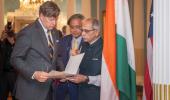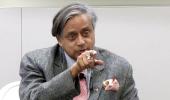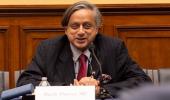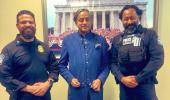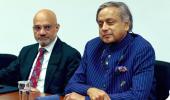The political and ideological differences between the Congress and Shashi Tharoor is no longer a matter of whispers.

Once hailed in the West as 'India's Rasputin' and considered the de facto number two to Jawaharlal Nehru, V K Krishna Menon embodied the paradox of being a global citizen who struggled to belong within his own party.
Menon's eventual exile from the Congress mainstream remains a study in political alienation -- one that, increasingly, observers in Kerala now see echoed in the trajectory of Shashi Tharoor, member of the Lok Sabha from Thiruvananthapuram.

Tharoor, like Menon, is internationally popular, and seen as independent-minded.
And like Menon, he is now grappling with a widening gulf between himself and the Congress that once celebrated him.
The latest friction arose over his nomination to the Union government's foreign outreach initiative after Operation Sindoor -- a move that has drawn more ire from his party than from political rivals.

Bharatiya Janata Party MPs Shashank Mani Tripathi, Bhubaneswar Kalita, former Ambassador Taranjit Singh Sandhu, JMM MP Sarfaraz Ahmad, Telugu Desam Party MP Ganti Harish Madhur, India's Ambassador to the United States Vinay Mohan Kwatra are also seen. Photograph: ANI Photo
The political and ideological differences between the Congress and Tharoor is no longer a matter of whispers.
Though divergence between his post-ideological, neo-liberal views and the Congress' traditional line on the matter of development has surfaced repeatedly, this time, it is his apparent alignment with a nationalist narrative -- similar to that of the BJP -- that has stirred the pot.
"Tharoor's case can be compared to that of Menon," says Sunnykutty Abraham, a veteran political commentator.
"A person with a global citizen image, failing to adjust to the party lines. The only difference is, at that time, the Congress was at its strongest point with Nehru and others around."

Abraham argues that Tharoor is unwittingly echoing BJP rhetoric in ways the Congress finds hard to accept.
The government's decision to appoint Tharoor as head of a multi-party delegation tasked with presenting India's position on terrorism, particularly regarding Pakistan, was met with swift pushback.
His name was notably absent from the four-member list submitted by the Congress for the mission. Yet he was on the plane, leading the conversation abroad.
Among the most vocal critics was Jairam Ramesh, Congress general secretary in charge of communications, who quipped: 'Congress mein hona aur Congress ka hona mein zameen-aasmaan ka antar hai' -- being in the Congress and being of the Congress are worlds apart. He likened the party to the Ganga, with many tributaries, 'some of them dry up and some get polluted'.

Tharoor's remarks on the 2016 surgical strike across the Line of Control -- where he acknowledged it as India's first such cross-LoC retaliation for terrorism -- added fuel to the fire.
Congress Spokesperson Pawan Khera promptly flagged Tharoor's own words from his 2018 book The Paradoxical Prime Minister, where he had accused the BJP of 'shamelessly exploiting' the strikes for electoral gain.
At the time, Tharoor insisted that the Congress had authorised similar covert operations without politicising them.

To Khera's remarks, Tharoor replied on X: 'For those zealots fulminating about my supposed ignorance of Indian valour across the LoC in the past...
'I was clearly and explicitly speaking only about reprisals for terrorist attacks and not about previous wars.'
His comments, he added, had been framed by reference to 'several attacks that have taken place in recent years alone'.

To many in Kerala, these developments mirror deeper undercurrents.
Tensions within the Congress' state unit are playing out in parallel.
Tharoor's own rising stature and recurring calls for a greater role in party affairs have unsettled others with chief ministerial ambitions -- among them Congress General Secretary K C Venugopal, Leader of Opposition in the state V D Satheesan, and senior leader Ramesh Chennithala.

The recent appointment of Sunny Joseph, a leader from Kannur, as Kerala Pradesh Congress Committee president ahead of the 2026 assembly elections has also added to speculation of internal balancing acts.
Tharoor, who has the backing of key allies like the Indian Union Muslim League, is viewed in some quarters as a political threat, not least because he was once labelled a 'parachute' candidate when he first stood from Thiruvananthapuram in the 2009 Lok Sabha polls.
"He is not above the Congress that has given him a seat to contest, and the party workers who helped him in his victory. There is a line that you should follow in Indian politics," says J Prabhash, political analyst and former pro vice-chancellor, Kerala University.
This is not the first time the party and Tharoor are on different pages.
When the Congress opposed the privatisation of Thiruvananthapuram airport and its handover to the Adani group, the MP openly backed the project, positioning himself as pro-industry.
He repeated this stance during the Vizhinjam port protests, where Congress support for agitating fishermen was met by Tharoor's endorsement of the infrastructure initiative.
Most recently, ahead of Kerala's global investors' summit, he penned a newspaper article describing the state as 'investor-friendly' -- a phrase that jarred with the party's official line that Kerala was an industrial laggard.

"He obviously owes some commitment to the party. He cannot speak in a way that gives political mileage to the BJP on key issues," argues Abraham.
Speculation is now mounting over whether Tharoor sees a future for himself within the Congress at all -- or whether he is charting a more independent path as a global citizen.
While he has always dismissed any suggestion of joining the BJP, theories abound: A possible second attempt at the UN secretary-general post with tacit government support (arguably a long shot), a lateral move to key posts in India, or simply a transition to life above the party fray -- India's statesman without portfolio.
In 1957, V K Krishna Menon famously spoke for over eight hours at the UN Security Council, defending India's position on Kashmir -- a feat that earned him the moniker 'Hero of Kashmir'.
As Shashi Tharoor spearheads India's global narrative after Operation Sindoor, he may well be shaping his own legacy as another kind of hero on the global stage.
'Tharoorism' over the years
2006
2009
2010
2012
2014
2019
2024
2025
Photographs curated by Manisha Kotian/ Rediff
Feature Presentation: Ashish Narsale/Rediff

